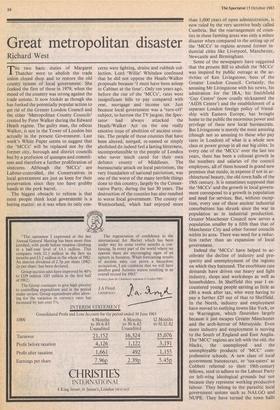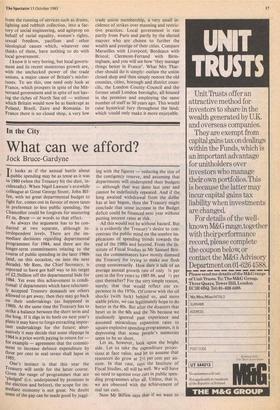Great metropolitan disaster
Richard West
The two basic duties of Margaret Thatcher were to abolish the trade union closed shop and to restore the old county system of local government. She funked the first of these in 1979, when the mood of the country was strong against the trade unions. It now lookds as though she has funked the potentially popular action to get rid of the Greater London Council and the other 'Metropolitan County Councils' created by Peter Walker during the Edward Heath regime. The guilty man, the odious Walker, is not in the Tower of London but actually in the present Government. Last week's White Paper seems to suggest that the `MCCs' will be replaced not by the former city, borough and district councils but by a profusion of quangos and commit- tees and therefore a further proliferation of sinecures. Although the `MCCs' are Labour-controlled, the Conservatives in local government are just as keen for their preservation since they too have grubby hands in the pork barrel.
The biggest obstacle to reform is that most people think local government is a boring matter: so it was when its only con- cerns were lighting, drains and rubbish col- lection. Lord 'Willie' Whitelaw confessed that he did not oppose the Heath/Walker proposals because 'I must have been asleep in Cabinet at the time'. Only ten years ago, before the rise of the `MCCs', rates were insignificant bills to pay compared with rent, mortgage and income tax. Just because local government was a `turn-off' subject, to borrow the TV jargon, the Spec- tator had always attacked the Heath/Walker Act on the one really emotive issue of abolition of ancient coun- ties. The people of those counties that have been altered, merged, re-named or simply abolished do indeed feel a lasting bitterness, incomprehensible to the people of London who never much cared for their own defunct county of Middlesex. The bureaucratic attack on local patriotism, the very foundation of national patriotism, was one of the worst of the many terrible things done to this country, largely by the Conser- vative Party, during the last 30 years. The destruction of the counties has also resulted in worse local government. The county of Westmorland, which had enjoyed more
than 1,000 years of open administration, is now ruled by the very secretive body called Cumbria. But the rearrangement of coun- ties in these farming areas was only a minor disaster when compared to the setting up of the `MCCs' in regions around former in- dustrial cities like Liverpool, Manchester, Newcastle and Birmingham.
Some of the newspapers have suggested that the present Bill to abolish the 'MCCs' was inspired by public outrage at the ac- tivities of Ken Livingstone, boss of the Greater London Council. Certainly, the amusing Mr Livingstone with his newts, his admiration for the IRA, his Smithfield 'Gay Centre' (now cruelly nicknamed the 'AIDS Centre') and the establishment of a separate London foreign policy of friend- ship with Eastern Europe, has brought home to the public the enormous power and privilege of these new local bureaucrats. But Livingstone is merely the most amusing (though not so amusing to those who pay rates in London) of what is a whole new class or power group in all our big cities. In every one of the `MCCs' over the last ten years, there has been a colossal growth in the numbers and salaries of the council employees, all of them housed in grand new premises that outdo, in expense if not in ar- chitectural beauty, the old town halls of the 19th century. It is sometimes supposed that the `MCCs' and the growth in local govern- ment correspond to a growth in population and need for services. But, without excep- tion, every one of these ancient industrial conurbations has shrunk since the war in population as in industrial production. Greater Manchester Council now serves a population smaller by a fifth than that of Manchester City and other former councils within its area. There was need for a reduc- tion rather than an expansion of local government.
Indeed the `MCCs' have helped to ac- celerate the decline of industry and pro- sperity and unemployment of the regions on which they battened. The exorbitant rate demands have driven out heavy and light industry, shops and workshops as well as householders. In Sheffield this year I en- countered young people earning as little as £80 a week after tax, who were having to pay a further £25 out of that to Sheffield. In the North, industry and employment have moved to outlying towns like York, or to Warrington, which flourishes largely because it just escapes Greater Manchester and the arch-horror of Merseyside. Even more industry and employment is moving to the South of England and East Anglia. The 'MCC' regions are left with the old, the blacks, the unemployed and the unemployable products of 'MCC' com- prehensive schools. A new class of local government bureaucrats, or 'tax-eaters' as Cobbett referred to their 19th-century fellows, tend to adhere to the Labour Party on left-wing ideological grounds but not because they represent working productive labour. They belong to the parasitic local government unions such as NALGO and NUPE. They have turned the town halls from the running of services such as drains, lighting and rubbish collection, into a fac- tory of social engineering, and agitprop on behalf of racial equality, women's rights, sexual freedom, pacifism and other ideological causes which, whatever one thinks of them, have nothing to do with local government.
I know it is very boring, but local govern- ment and its recent monstrous growth are, with the unchecked power of the trade unions, a major cause of Britain's misfor- tunes. To see this, one need only look at France, which prospers in spite of the Mit- terrand government and in spite of not hav- ing the riches of North Sea oil — without which Britain would now be as bankrupt as Polapd, Brazil, Zaire and Romania. In France there is no closed shop, a very low trade union membership, a very small in- cidence of strikes over manning and restric- tive practices. Local government is run partly from Paris and partly by the elected mayors who are chosen to further the wealth and prestige of their cities. Compare Marseilles with Liverpool; Bordeaux with Bristol; Clermont-Ferrand with Birm- ingham, and you will see how 'they manage things better in France'. What Mrs That- cher should do is simply: outlaw the union closed shop and then simply restore the old counties, cities, borough and district coun- cils, the London County Council and the former small London boroughs, all housed in the premises and employing the same number of staff as 30 years ago. This would raise hysterical fury throughout the land; which would only make it more enjoyable.











































 Previous page
Previous page